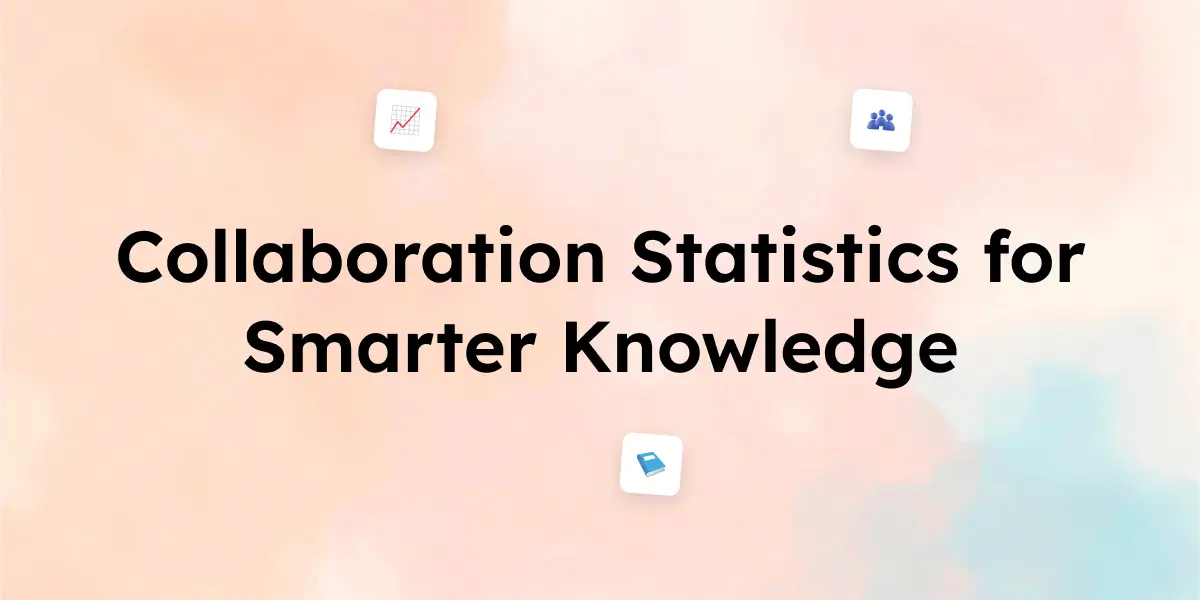In today’s digital-first workplace, effective collaboration is the key to business success. With remote and hybrid work models becoming the norm, organizations must find innovative ways to enhance knowledge sharing, streamline communication, and boost productivity.
Studies show that employees spend up to 20% of their workweek searching for information, leading to inefficiencies, frustration, and knowledge silos. By adopting AI-powered collaboration tools, cloud-based platforms, and structured knowledge management strategies, businesses can significantly reduce redundant work, accelerate decision-making, and foster innovation.
To help Knowledge Management Teams stay ahead, we’ve compiled 20+ key collaboration statistics for 2025—covering remote work trends, AI-driven knowledge sharing, productivity boosts, and security considerations.
Key Collaboration Statistics for Smarter Knowledge Sharing
📌 General Collaboration Trends
- 85% of employees believe collaboration tools improve overall team productivity.
- Companies with strong collaboration cultures are 5x more likely to retain employees.
- 90% of executives say improving knowledge-sharing processes is a top priority in 2025.
- Organizations using AI-driven collaboration tools see a 35% reduction in redundant work.
📌 Remote & Hybrid Work Collaboration
- 74% of hybrid workers struggle with knowledge silos due to fragmented communication.
- Businesses using centralized knowledge-sharing platforms reduce information search time by 50%.
- 61% of remote teams report that lack of real-time collaboration slows down project execution.
- Companies with structured knowledge-sharing systems experience a 40% increase in project efficiency.
📌 AI & Automation in Knowledge Sharing
- AI-driven collaboration tools increase knowledge retrieval speeds by 70%.
- 82% of organizations implementing AI-based knowledge management see an increase in cross-team innovation
- Chatbots and AI assistants reduce internal communication delays by 45%.
- 56% of businesses plan to invest in AI-powered knowledge-sharing tools in 2025.
📌 Productivity & Efficiency Gains
- Employees spend 20% of their workweek searching for information due to poor knowledge-sharing systems.
- Effective knowledge-sharing strategies lead to a 30% increase in team productivity.
- Companies that foster collaboration see a 17% faster decision-making process.
- 79% of employees say they would be more engaged if their company improved knowledge-sharing.
📌 Security & Data Governance in Collaboration
- 60% of organizations experienced data loss due to poor knowledge management.
- Businesses using secure cloud-based collaboration tools see 43% fewer security incidents.
- 95% of IT leaders prioritize security in knowledge-sharing platforms.
📌 Future of Knowledge Collaboration
- By 2027, AI-driven knowledge systems will power over 75% of workplace collaboration.
- 80% of Fortune 500 companies are investing in next-gen knowledge-sharing platforms.
- Employee adoption of collaboration tools is expected to increase by 50% in the next two years.
Final Thoughts: How Knowledge Management Teams Can Adapt
To stay ahead, Knowledge Management Teams should focus on:
✅ Investing in AI-powered collaboration tools for faster knowledge retrieval.
✅ Enhancing security in knowledge-sharing to prevent data loss.
✅ Encouraging a collaborative culture to improve productivity and innovation.
By leveraging these trends, organizations can reduce information silos, enhance decision-making, and drive smarter knowledge-sharing strategies in 2025.
Conclusion: The Future of Knowledge Sharing & Collaboration
The workplace of 2025 demands smarter, more efficient knowledge-sharing strategies. Companies that invest in AI-driven collaboration tools, cloud-based knowledge platforms, and security-focused solutions will outperform competitors by reducing inefficiencies and fostering innovation.
Key takeaways for Knowledge Management Teams:
✅ Implement AI-powered knowledge-sharing platforms
✅ Reduce information silos with centralized, searchable databases
✅ Prioritize security and compliance in collaboration tools
✅ Encourage a culture of open communication and knowledge sharing
As organizations adapt to new work environments, those that optimize collaboration will see the biggest productivity and engagement gains in 2025 and beyond.
FAQs
1. What is the impact of poor knowledge sharing on organizations?
Poor knowledge sharing can lead to productivity loss, duplicated work, slow decision-making, and disengaged employees. Studies show that employees waste 20% of their time searching for information due to ineffective knowledge management.
2. How do AI and automation improve collaboration?
AI-driven collaboration tools reduce information retrieval time by 70%, automate repetitive tasks, and enhance decision-making through real-time data insights and intelligent recommendations.
3. What are the top tools for workplace collaboration in 2025?
Some of the top collaboration tools include Microsoft Teams, Slack, Notion, Trello, Asana, and AI-powered knowledge bases like Guru and Confluence.
4. How does knowledge sharing impact employee engagement?
79% of employees say they would be more engaged if their company had better knowledge-sharing processes. Transparent collaboration fosters a sense of inclusion and teamwork.
5. What are the biggest challenges in workplace collaboration?
Common challenges include:
Knowledge silos in hybrid/remote teams
Lack of structured knowledge management
Security concerns in data sharing
Employee resistance to adopting new tools



